Empowering Women Environmental Defenders’ Voices through Data Storytelling
In today’s ever-changing world, where we navigate a landscape overflowing with information, the ability to make sense of data and use it for informed decision-making becomes essential. Yet for many Women Environmental Defenders (WED), their stories are often lost or told in ways that dehumanize them and in some circumstances vilify them. By focusing on building capacity for data literacy and storytelling, we can help WED to take control of their own narratives. These skills are more crucial than ever before, particularly for underrepresented and marginalized groups, such as indigenous women. They not only empower these groups to advocate more effectively, but enhance their critical thinking and problem-solving abilities, which are valuable in many aspects of their daily lives and advocacy works.
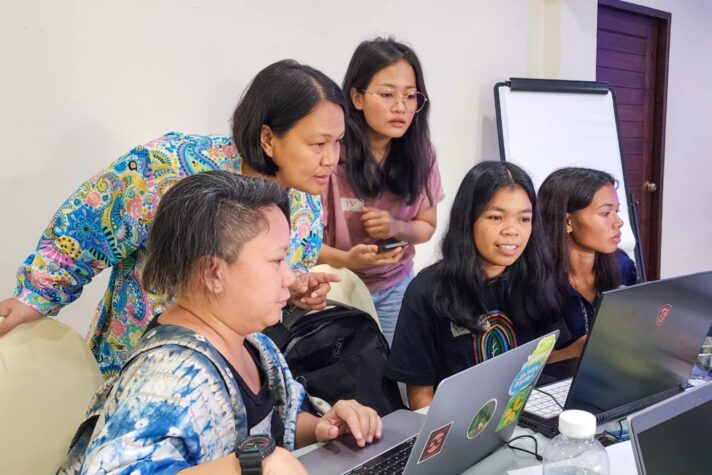
Participants were supportive of each other at the “Data Storytelling for Women in the Mekong,” organized during June 13-15, 2024 in Chiang Mai, Thailand. Photo by EWMI-ODI under CC BY-SA 4.0
Data Storytelling by Any Other Name…
There are many terms utilized to describe storytelling; including data storytelling, evidence-based storytelling, data journalism, and citizen journalism. The one commonality of these terms is that they offer the opportunity for the storytellers to use data (or evidence or lived experiences) to craft and present narratives from their own perspectives.
Our program specifically looks at data literacy as a crucial skill gap (the ability of individuals to find, access, read, work with, and analyze data) as a necessity to inform their narratives around issues concerning them. In an increasingly data-driven world, it’s not just a technical skill; it’s a vital tool for everyone–from policymakers who design policy and monitor service delivery, to citizens who want to engage in meaningful dialogue and hold their governments accountable. It highlights and aids decision making that can be made more inclusively with different perspectives and thus more responsibly. By coupling this with storytelling, we craft skills in the art of using data to tell compelling stories. It involves more than just presenting facts and figures; it’s about weaving data into narratives that engage and inform audiences. Every culture has its own stories and narratives. Good data storytelling helps communicate the cause and effect of an issue to effectively advocate for change.
A Proven Training Model
The East-West Management Institute (EWMI) adapted an innovative training model from the World Bank’s Data Use and Literacy (DUAL) Program, initially implemented in Nepal and the Philippines. With support from the World Bank, EWMI conducted a pilot workshop, which inspired its partner Open Development Cambodia (ODC), to replicate the program. ODC launched a year-long training program for 29 participants in Cambodia, featuring multiple in-person workshops, virtual follow-ups, and ongoing mentorship. They further customized and translated the materials into Khmer, reaching over 2,500 Cambodian government officials, journalists, and civil society members with data skills training.
Building on this success, the Open Development Initiative (ODI) under EWMI expanded the program to other Mekong countries, customizing it as needed for different target audiences. This expansion reached over 300 additional participants across ten countries, with a focus on environmental issues, Indigenous Peoples’ rights, and data sovereignty.
Ongoing Demand and Need
In Chiang Mai, we brought together women environmental defender leaders from across Southeast Asia to deliver our innovative approach to upskilling these women in order for them to harness data for impactful storytelling and policy influence. The ongoing need for this training is still apparent. On June 13-15, 2024, the ODI hosted a data storytelling workshop, supported by the World Bank, to aid WED in their advocacy efforts. 17 women from six countries–Cambodia, Lao PDR, Myanmar, Thailand, the Philippines, and Vietnam–showcased their leadership power in data literacy and storytelling through specific advocacy projects to advance rights and empower communities they work in.
Despite the brief duration of the training, participants left the workshop with a high sense of satisfaction, appreciating both the content and methodology. They valued the opportunity to develop their data storytelling skills, although many felt additional time was needed to fully explore various topics and to practically complete their projects.
Spotlight on Participants:
Kanlayanee Thiansaichon, a Thai volunteer with the Romphothi Foundation in Northern Thailand, with expertise in social media and videography, shared her thoughts on the training: “This training provided valuable knowledge and hands-on experience. I discovered new concepts that are beneficial to my work.” Her data-storytelling work focused on environmental issues in the Kok River basin, where water flows from the Mong Kok to the Mekong River (Graphic 1). She highlighted the impacts of extractive industries, including sand mining downstream in Tha Ton and coal mining upstream in the Mekong river basin. These activities have led to a loss of native seeds and fish species, changes in water flow, water contamination, and job losses in agriculture and fisheries in and around the Kok River basin.
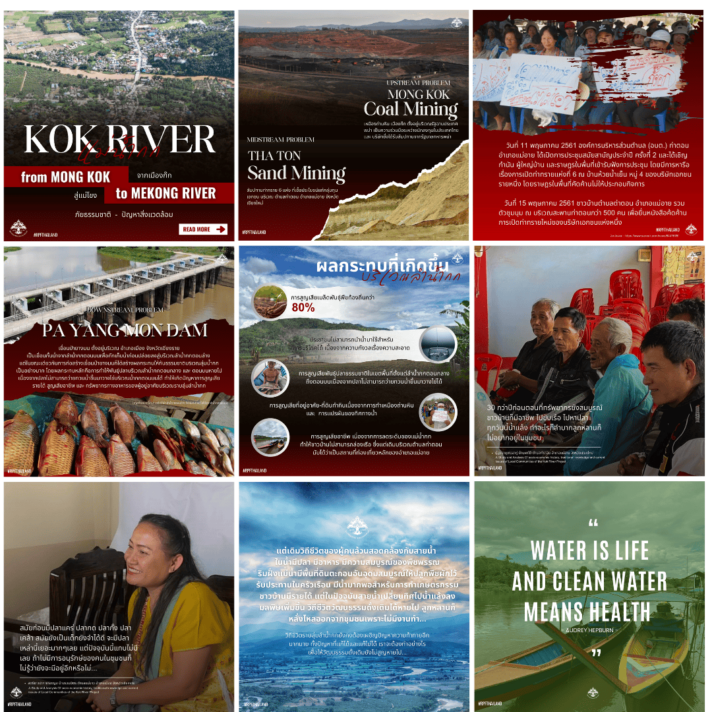
Graphic 1: Environmental issues in the Kok River basin by Kanlayanee Thiansaichon
Anisone Sosoukan, a Laos leader of the Fundraising Unit of the Don’t Stop Dream Team (DSDT), shared: “The training introduced me to new topics and experiences, particularly in extracting and cleaning data from PDFs. I gained valuable insights into data management and cleaning techniques, which were new to me.” As a young leader, she was capable of telling a compelling story and sharing her experiences to new volunteers; this is now enhanced with the use of data visuals. She also designed a promotional graphic (Graphic 2) to introduce her organization, incorporating her own insights and experiences.
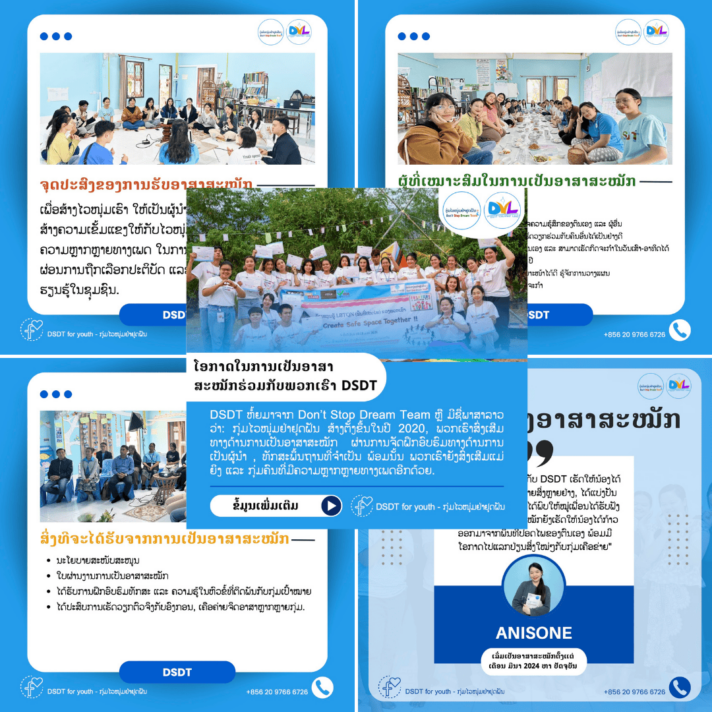
Graphic 2: Volunteering Experience at DSDT by Anisone Sosoukan
Nguyen Thu Thuy from the Center for Public Health and Community Development (CEPHAD) in Vietnam shared her feedback: “The training was immensely useful for our data analysis and publication efforts. Learning to use tools like Flourish, Pivot Tables, and Canva, along with techniques for cleaning and standardizing data, has significantly enhanced my ability to produce professional products for our community.” By the end of the training, she created a leaflet titled, “An Impact Story from Dan Chu commune, Cao Bang Province” (Graphic 3), which highlights the benefits of adopting innovative farming practices, the positive impact of gender equality on community participation, and the personal and communal growth achieved through knowledge sharing and engagement.
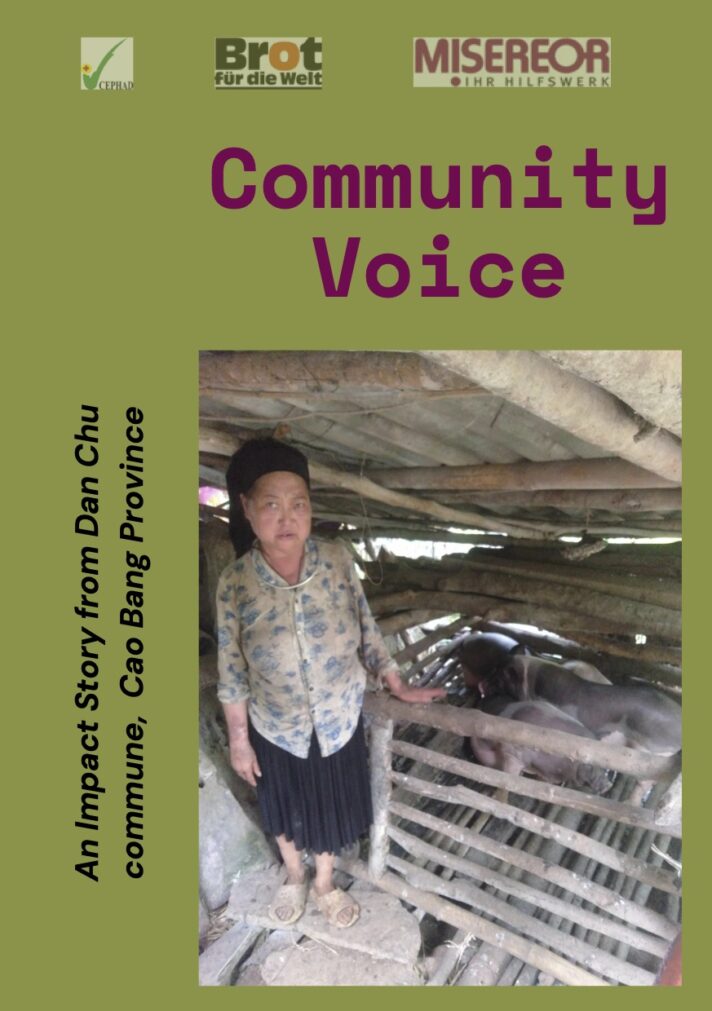
Graphic 3: A leaflet cover about “An Impact Story from Dan Chu commune, Cao Bang Province” by Nguyen Thu Thuy
Monitte O. Lantas from UGNAYIN National Indigenous Youth Network from the Philippines shared her appreciation for the training, emphasizing its practical impacts on her work. She noted, “The skills in data analysis using pivot tables are extremely valuable for my thesis, and visualizing data with Flourish will benefit both my studies and our organization’s data collection efforts.” Despite the limited duration of the training, Monitte praised the session for its clarity and the facilitator’s ability to make complex topics comprehendible and engaging. At the end of the training, she created a story titled, “Palawan: The Last Ecological Frontier of the Philippines or Mining Capital of the Philippines.” (Graphic 4)
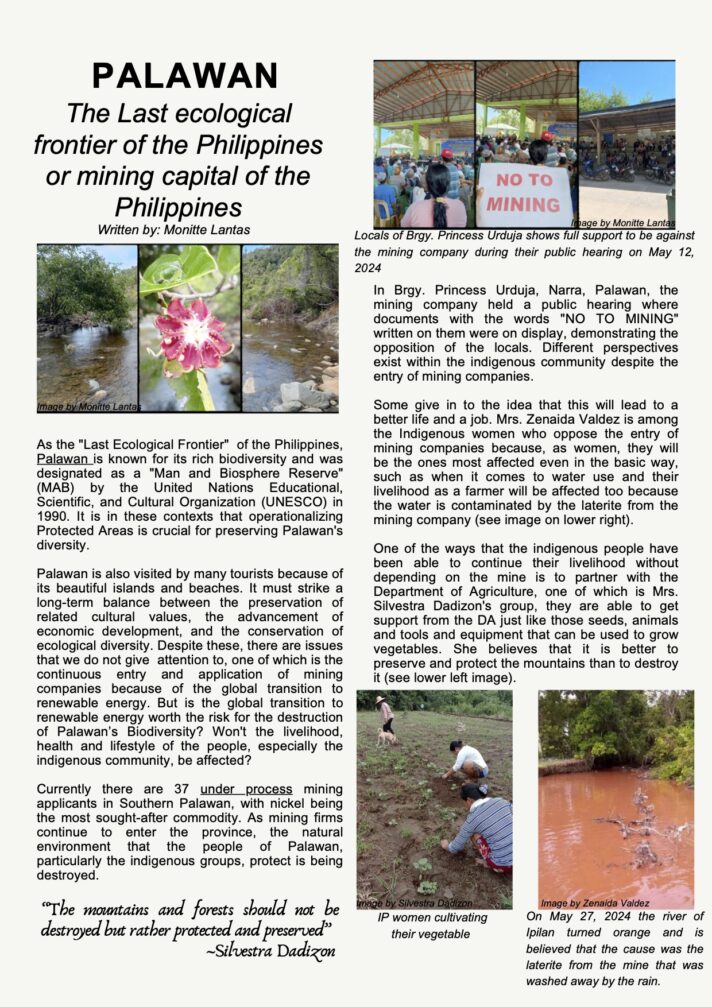
Graphic 4: Story entitled, “Palawan: The Last Ecological Frontier of the Philippines or Mining Capital of the Philippines” by Monitte O. Lantas
Nang Shining, who recently joined Open Development Myanmar, shared her experiences and reflections on the workshop, highlighting its impact. “My journey began when I realized the crucial need to utilize vast amounts of data we encounter daily and transform it into compelling narratives,” she said. “Data literacy empowers us to control our narratives using technology rooted in a data rights approach. With the right tools and knowledge, anyone can harness data to advocate for causes and make a positive impact in their community.” She also appreciated the opportunity to present her planned data storytelling project, “Enhancing Women’s Leadership in Building Resilience and Adaptation to Climate Change Through Sustainable Natural Resource Management: Future Perspectives for Land, Forest, and Livelihoods in Myanmar.” She noted, “The feedback I received was constructive and encouraging, boosting my confidence and reinforcing my storytelling framework.”
The Impact
It’s exciting to witness the multiplier effect of the original training program from Nepal across a dozen countries in Asia. Thanks to the initial World Bank funding, its replicable approach this program has sparked interest from a wider community of donors and civil society organizations. The World Bank and EWMI share these experiences and the lessons that emerged from it in this report.
Integrating data literacy and storytelling training into existing programs has been crucial to the ODI in empowering civil society, enhancing the skills of people within the community forestry network, and advancing Indigenous data sovereignty rights. The results contribute significantly in formulating a regional framework aimed at strengthening the data ecosystem and its governance.
Yet we recognise that these skills are preliminary still as our audience begins to simply be inspired that they too can produce content from their realities for public consumption. As one of the women leaders participating in the EWMI’s project on Indigenous Women’s Storytelling in Vietnam said, “We all feel surprised when looking at the stories we made and the process we went through to achieve this. [The stories are about] simple things around us but [it is] so important and valuable to express our ethnicity’s characteristics. I’m so proud of it.”
We continue to work with women’s groups and underrepresented communities throughout the Mekong region to facilitate data governance and stewardship of narrative control by non-state actors is the priority and legitimized. We invite anyone facing environmental challenges or interested in data literacy and storytelling to contact us for further discussion on how we can support you on this journey.
<< Back to Data Literacy Programme
This content is supported by the World Bank’s Data Use and Literacy Program and implemented by the East-West Management Institute – Open Development Initiative, in collaboration with the Knowledge for Development Foundation (K4D). The initiative focuses on empowering women’s narratives through data literacy training, integrated with the Women in Water Governance program, supported by the Data for Development Network of the International Development Research Centre (IDRC). The views expressed herein are those of the author(s) and do not necessarily reflect the views, policies, or positions of the World Bank or IDRC.

